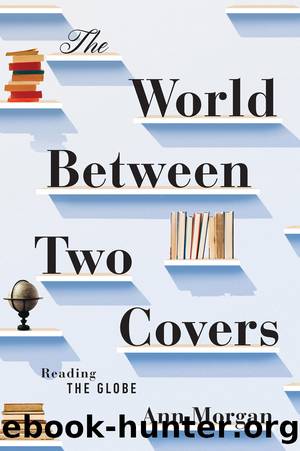The World Between Two Covers by Ann Morgan

Author:Ann Morgan
Language: eng
Format: epub
Publisher: Liveright
Published: 2015-08-14T16:00:00+00:00
8
Broadening the mind
empathy and politics in literature
Ever since Aristotle outlined his thoughts on catharsis in his Poetics back in the fourth century BCE – and probably well before that – people have been fascinated by the power of stories to make us feel things. From Hamlet’s passionate outburst at an actor’s portrayal of the murder of King Priam to Anne Shirley’s fascination with Tennyson’s ‘The Lady of Shalott’, literature is full of characters who exhibit a range of strong reactions to the imaginary experiences of others. In recent years the emphasis has been less on the carthartic properties of books, and more on the question of empathy and the capacity that literature may have to take us into the experiences of other people and thereby influence how we act. At stake is the question of whether reading books – commentators have tended to focus on fiction, but I would extend the question to non-fiction stories too – might actually make us better people (no small matter in this age of arts funding cuts, when creative types are often required to justify the value of their craft).
At first glance, the evidence looks promising. After centuries of insistence from bibliophiles like French philosopher and Resistance fighter Roger Garaudy that ‘a good book . . . is a force, a tool, a weapon to make the dreams of today become the reality of tomorrow’, numerous researchers seem to be demonstrating the ability of stories to boost our emotional intelligence. The Dutch scholar Jèmeljan Hakemulder investigated how reading literature affected people’s empathy with those in socially marginalised groups in his 2000 book The Moral Laboratory, concluding that the resultant ‘enhancement of insight into human thoughts and emotions may bridge individual as well as cultural differences’. More recently, a study by David Comer Kidd and Emanuele Castano at the New School for Social Research in New York suggested that reading literary fiction enhances people’s ability to gauge the emotions of their fellow human beings. Testing 1,000 participants’ Theory of Mind (ability to attribute mental states, beliefs, desires, intents and knowledge to others), the duo found that those who had been given literary texts to peruse at the start of the session consistently scored higher than those who had been given other works. They attributed this to the fact that the process of gap-filling required by literature brings the same psychological processes into play as we use when negotiating real-life relationships. ‘Fiction is not just a simulator of a social experience, it is a social experience,’ claims Kidd. Meanwhile, some researchers have shown that the ability to empathise is an important indicator of how well someone is likely to be able to read in the first place. Southeastern Louisiana University psychologist Dr Tammy Bourg, for example, has done work with children which demonstrates that the ability to intuit others’ feelings at the age of eight can be used as an indicator of what their reading ability is likely to be when they are ten or eleven, with those scoring highest in the first tests doing better later.
Download
This site does not store any files on its server. We only index and link to content provided by other sites. Please contact the content providers to delete copyright contents if any and email us, we'll remove relevant links or contents immediately.
| Ancient & Classical | Arthurian Romance |
| Beat Generation | Feminist |
| Gothic & Romantic | LGBT |
| Medieval | Modern |
| Modernism | Postmodernism |
| Renaissance | Shakespeare |
| Surrealism | Victorian |
4 3 2 1: A Novel by Paul Auster(11052)
The handmaid's tale by Margaret Atwood(6856)
Giovanni's Room by James Baldwin(5879)
Big Magic: Creative Living Beyond Fear by Elizabeth Gilbert(4723)
Asking the Right Questions: A Guide to Critical Thinking by M. Neil Browne & Stuart M. Keeley(4576)
On Writing A Memoir of the Craft by Stephen King(4214)
Ego Is the Enemy by Ryan Holiday(3991)
Ken Follett - World without end by Ken Follett(3973)
The Body: A Guide for Occupants by Bill Bryson(3802)
Bluets by Maggie Nelson(3711)
Adulting by Kelly Williams Brown(3671)
Guilty Pleasures by Laurell K Hamilton(3587)
Eat That Frog! by Brian Tracy(3514)
White Noise - A Novel by Don DeLillo(3436)
The Poetry of Pablo Neruda by Pablo Neruda(3367)
Alive: The Story of the Andes Survivors by Piers Paul Read(3312)
The Bookshop by Penelope Fitzgerald(3229)
The Book of Joy by Dalai Lama(3218)
Fingerprints of the Gods by Graham Hancock(3214)
